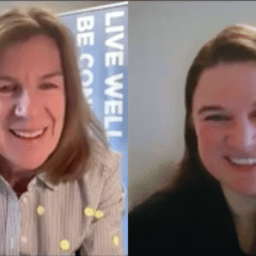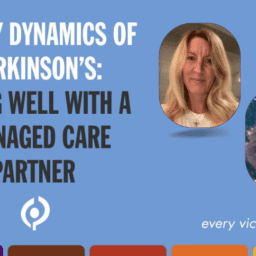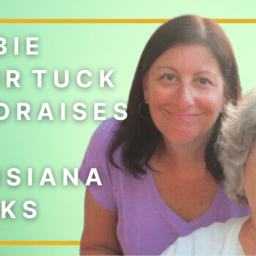Connie Carpenter Phinney taking a moment to watch the sunset as a storm rolls in. Photo by Davis Phinney.
The panel for the September 2023 Care Partner Meetup included Executive Director Polly Dawkins, Ambassadors and Parkinson’s Care Partners Pat Donahoo and Gail Gitin, and Connie Carpenter Phinney, who wrote the follow-up below. We were also very glad to have a special guest join us this month: Kathleen Crist.
NOTES FROM this month’s meetup
Written by Connie Carpenter Phinney
September’s Care Partner Meetup topic was inspired by questions our beloved Ambassador Gail Gitin has received regarding how care partners can access help in their daily lives and also with arranging respite care.
Gail shared a story about someone seeking respite care but who encountered resistance from her husband when she tried to get him to temporarily check-in to a care facility. To thwart her efforts, the husband acted out during auditions and no one would admit him. Gail talked about how some care partners are under appreciated, which compounds problems.
This month we also had a special guest: Kathleen Crist, executive director of the Houston Area Parkinson Society. Kathleen has a master’s degree in social work and 20 years of experience working with people with Parkinson’s. She has also served as a care partner for her grandmother and now her mother, who lives with Alzheimer’s.
Some Key Points of Advice from Kathleen
Kathleen encouraged what she calls “responsible independence” when working with care partners and people with Parkinson’s. She asked care partners to consider ways to empower our person with Parkinson’s and how we can include them in decision-making. However, she noted that this depends on the level of cognitive impairment, which widely varies among people with Parkinson’s.
Loss is an essential part of this conversation: Your person with Parkinson’s may be feeling a loss of identity and loss of being able to contribute. Sometimes, it’s too easy for the care partner to dive in and exert too much control.
Kathleen also counseled us to take care in our word choices and to alter our vocabulary to avoid making our person with Parkinson’s feel like an infant. For example, if you need someone to sit with your person, don’t call them a “sitter” as you might have done with your children. Instead of adult “diaper,” try the term “undergarment.”
The Shifting Dynamic and Some Tips for Easing Burdens
I noted that all care partners are likely to experience a shifting dynamic in their duties. The experience of being a care partner is not linear, but very much up and down. Most often, it is highly unpredictable.
Gail said the people who come to her for advice feel desperate because dementia or other cognitive difficulties often contribute to a lack of cooperation from the person with Parkinson’s. It is important to find things to do together that don’t require talking about Parkinson’s but center more on enjoying life.
Some of our friends talked about playing cards or how they keep a joke book on hand to share. Some read to each other every morning. Pat encouraged couples to set a date night where they try to forget about Parkinson’s; have a set night to go out. If that’s not possible, order dinner in and have it delivered. Watch a movie–don’t talk or think about Parkinson’s.
Feeling appreciated can also help ease everyone’s burden: We talked about encouraging our person with Parkinson’s to practice gratitude for what they can do for themselves and for their care partner. This a two-way street.
The Importance of Clear Communication
Clear communication is another key point in navigating the changing experience of living with Parkinson’s and the challenges of being a care partner. Kathleen coached care partners to clearly voice their concerns to the person with Parkinson’s by saying, “I need help.” Even normal aging introduces challenges that require extra support.
One possibility is to start involving extra help in a very focused way. Maybe bring someone in–a paid aid, a friend, or another family member to sit with your person and chat for a few hours while you step away. Perhaps they can help your person get out for a walk or just to sit outside. Any specific activity that can help you step away can go a long way.
Expectations and Grief
Everyone’s experience changes over time, so expectations will change, too. Being clear about expectations and honest about how these expectations will change is important. For example, you might not be able to expect much show of gratitude from a person with cognitive challenges.
Changing experiences can contribute to increased grief, depending upon the changes you’re observing. Importantly, grief is part of the experience for both the care partner and the person with Parkinson’s.
Adjusting to “New Normals” and Letting Go of Guilt
Pat said that instead of accepting that Parkinson’s is a steady, downward spiral, he works to plan and reframe whatever they are going through.
Reframing sometimes involves big changes, like changing doctors and adjusting medications. And even smaller changes can help you find new resources to help break a pattern of decline, but the first step is to believe that your journey does not have to be a steady downward trend.
Another key to this outlook is to know that making things better for yourself can have far-reaching effects. Pat said when he gets down, he calls a friend with Parkinson’s or another care partner to get reassurance and support.
Gail’s wisdom is important here, too: Acknowledge you are doing the best you can. When Gail was helping her husband at the end of his life, she started to feel like what she was living was a normal life; she only realized after he passed how abnormal it had been. The point is to understand how hard it can be: You–the care partner—might feel it’s your new normal, but it’s not other people’s normal.
Setting Boundaries and Being Yourself
Kathleen said she understands how hard it is to be a good care partner and also to be yourself. She acknowledged the superhuman requirements of caring, and the difficulty of absorbing loss and change. It can be hard to be the full person you want to be while being a care partner, but it is important to understand that it is okay to set boundaries.
For those newly diagnosed or more in the early or middle moments of “the game”–you know, the Game of Life with Parkinson’s—I added that I’d recommend negotiating boundaries and establishing a solid division of duties. For example, in our kitchen, Davis cleans up. He’s good at it, but it takes more time. Likewise, in our garage, Davis is responsible for bike maintenance. Ask yourself what your person with Parkinson’s does well and empower them to continue doing those things.
Kathleen also said it’s especially helpful to have space and time for yourself; she echoed comments I’ve made before about allowing yourself to reset and change the rules—to create more space for yourself and not lose yourself. On the topic of guilt about changing roles, she says it’s just a lousy endeavor that drags us down. She asked us all to let that go.
More Thoughts on How to Get Help When Your Person is Resistant
Near the end of our conversation, we returned to the first question about how to get help when the person with Parkinson’s is resistant.
Kathleen said resistance to finding extra help could result from your person with Parkinson’s trying to exert control when they are losing so much (and especially losing the ability to control their own illness). In those cases, it might help to have a third party come in to help negotiate for change, like a social worker, a clergy member, or someone from a hospital palliative care team. Gail, too, encouraged people looking for care to talk to a palliative care team within their hospital, as such teams are more adept at helping increase quality of life by sharing resources or leading you to where can you find help.
Acknowledge when you can’t keep up—and how hard it is to keep up–because you have your own issues and life to manage. Acknowledging these things together with your person with Parkinson’s can help you make some choices together and simplify the demands on your time. This conversation may even be a stepping stone to agreeing there is a breaking point and will accelerate the process of finding extra support.
Two questions that may be useful to ask your person are: “What does it look like when you are ready to have help?” and “What will you feel most comfortable with in terms of help?”
Join us next month!
Kathleen will return as a guest on November 7th. Our October 3rd meetup will be a discussion with our normal crew: Polly, Pat, Gail, and me. Join us! We are here for you.
Additional resources
Houston Area Parkinson’s Society
Advanced Parkinson’s: Symptoms, Complications, and Care Strategies
Would you like more information
on being a Parkinson’s care partner?
You can learn much more about living well as a Parkinson’s care partner today through our Every Victory Counts® Manual for Care Partners. Click the link below to get your free manual now.
Thank you to our 2023 Peak Partner Amneal for allowing us to make the manual for care partners available and free to all.

















